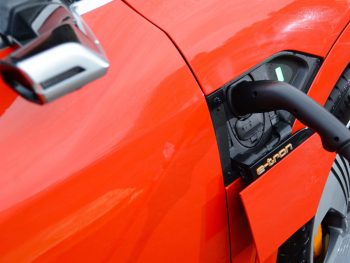UK car sales plummet but positive news on EVs
The UK’s new car sector has recorded its worst start to a year since 1970; a direct result of the lockdown and the closure of showrooms.

Combined, BEVs and plug-in hybrid vehicles (PHEVs) accounted for 13.7% of registrations in January 2021; compared to 12% for diesel
Just 90,249 new cars were registered in January – down 39.5% or 59,030 registrations on the same month in 2020, and reinforcing that showrooms need to open as soon as it’s safe to do so.
Demand was down for both private buyers (38.5%) and large fleets (39.7%); just 51,002 registrations were recorded for the latter compared to 84,364 in January last year, according to the figures from the Society of Motor Manufacturers and Traders (SMMT).
Registrations to the Business category for sub-25 fleets fell even sharper and were down 56.0%.
With lockdown restrictions in place until March – the most important month of the year for the sector – the SMMT noted that the industry will face a challenging year. It’s already downgraded its 2021 forecast to below 1.9 million new car registrations from its previous prediction of more than two million units. This would be up 15.7% on 2020 but still very subdued in historical terms; in 2019, the 10-year average total stood at 2.3 million.
There were some positive notes though. Uptake of battery electric vehicles (BEV) grew by 54.4% to 6,260 units – equating to 2,206 extra registrations. Plug-in hybrids (PHEVs) were up 28.0% to 6,124 units – almost exactly the same total as BEVs. Combined, BEVs and plug-in hybrid vehicles (PHEVs) accounted for 13.7% of registrations; compared to 12% for diesel.
The rise in BEVs and PHEVs means these powertrain types are now predicted to grow their combined market share to more than one in seven, from just over one in 10 new cars in 2020.
In contrast, petrol and diesel cars registrations both saw huge falls; down by 62.1% and 50.6% respectively. Hybrids also declined; down 23.9% to 6,826 units.
More positive news was in the SMMT’s publication of average new car emissions figures for 2020, with the largest-ever fall in CO2 recorded. Spurred on by increased uptake of BEV, PHEV and hybrid electric vehicles (HEVs), which accounted for almost one in six new car registrations last year, average vehicle CO2 dropped to 112.8g/km – a reduction of 11.8% compared to 2019 and 37.7% compared to 2000.
However, with the industry required to achieve a UK-only CO2 fleet average target of 95g/km this year or face severe penalties, the SMMT said that far greater uptake of low- and zero-emission cars is needed. It also said this underscores the need to get showrooms open as soon as Britain emerges from lockdown, so they can generate the demand required to reach the country’s green goals.
Mike Hawes, SMMT chief executive, commented: “Following a £20.4bn loss of revenue last year, the auto industry faces a difficult start to 2021. The necessary lockdown will challenge society, the economy and our industry’s ability to move quickly towards our ambitious environmental goals. Lifting the shutters will secure jobs, stimulate the essential demand that supports our manufacturing, and will enable us to forge ahead on the Road to Zero. Every day that showrooms can safely open will matter, especially with the critical month of March looming.”
Jon Lawes, managing director of Hitachi Capital Vehicle Solutions, said that despite the industry low in car registrations having continued into the new year, there remains a quiet, cautious optimism from many in the sector for the remainder of 2021, prompted by the vaccination roll-out, as well as new trade agreements in the pipeline for the UK.
He also greeted the continued increase in EV uptake in the face of a decline across petrol and diesel variants.
“With the 2030 ICE ban on the horizon, 2021 looks to be the year of the green revolution in the UK, as charging infrastructure accelerates to support growing demand and increasing numbers of manufacturers are set to bring more EVs to the mass market over the coming months. The industry must continue to encourage new buyers to future-proof their purchase by going green, by showcasing the number of mainstream and affordable EVs on offer.”
Lucy Simpson, head of EV enablement at Centrica Business Solutions, also called for further support to encourage EV uptake.
“With growing attention on the Government’s Road to Zero strategy and its commitment to ‘build back greener’ from coronavirus, financial incentives that encourage EV adoption and support the creation of better charging infrastructure must be among the priorities for the Budget on 3 March. While the latest round of government funding for on-street charging points is welcomed, we must continue to accelerate the rollout to meet demand when the sale of new petrol- and diesel-fuelled vehicles is banned in 2030. It’s important that this is done fairly to ensure the appropriate distribution of public charging infrastructure, our latest research showed that many local authorities are lagging behind and have no plans to improve their existing networks.
“Not only will mass adoption of EVs support the UK’s carbon goals and provide a boost to the green economy through job creation, it can also unlock direct financial benefits for businesses that use the latest energy technology to monetise their EV charging facilities and trade with the grid.”





